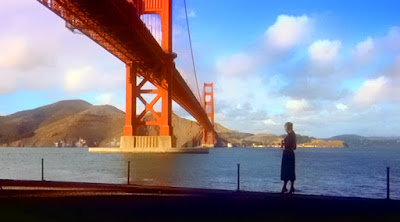We're already at the third entry of my cringe-inducingly monikered "FilmQuest 2012" column, as I right the wrongs of my cinema viewing past by watching 30 big/popular/seminal/oft-quoted gaps in my knowledge-bank. This time it's Alfred Hitchcock's 1958 thriller 'Vertigo' - regularly cited as its director's finest masterpiece. A lofty accolade indeed. Though widely seen as a disappointment at the time of release, its critical stock has steadily risen in the years since, to the point where it's now regularly near the summit of most respectable "best film of all-time" polls.
This rise is evident in the vaunted decadely poll of critics undertaken by Sight and Sound magazine, where 'Vertigo' rated 4th in 1992 and 2nd in 2002. It remains to be seen whether it goes one better, reaching the apex of this year's list, finally toppling regular winner 'Citizen Kane'. In any case its critical stock shows no sign of falling.
SPOILERS ahead
It's not difficult to see why this is, with a dazzling use of colour, some distinctive (still imitated) optical effects and Bernard Herrmann's deceptively simple score (recently the subject of a bitter feud after its use in silent hit 'The Artist'). Particularly outstanding is the film's second half in which James Stewart's acrophobia suffering retired cop John Ferguson totally loses his mind, becoming obsessed with a woman who looks identical to his (apparently dead) lover. Kim Novak plays both the Grace Kelly like Madeleine and her more earthy doppelgänger Judy: two women who turn out to be the same person in one of the film's numerous shocking twists.
For the more sedate first half it seems to be a kind of ghost story, as Ferguson is hired by a wealthy, old school pal (Tom Helmore) to spy on Madeleine, the wife he claims has been possessed by the spirit of a long-dead ancestor. It carries on in this vein for an hour of steadily building detective work, as John stalks Madeleine - providing a stunning tour of 1950s San Francisco along the way. By the end of the first half you just about believe the husband's far-fetched account offers the only viable explanation for his wife's behaviour. Then, in an admittedly clumsy confessional letter writing sequence, Judy confides to the viewer that she was posing as Madeleine the whole time, in order to allow the husband to carry out her murder without suspicion (it seems to all the world as if she has obviously committed suicide as a result of mental illness).
One of the rare voices of dissent against the film from the critical community has come from Tom Shone, who wrote: "Hitchcock is a director who delights in getting his plot mechanisms buffed up to a nice humming shine, and so the Sight and Sound team praise the one film of his in which this is not the case – it's all loose ends and lopsided angles, its plumbing out on display for the critic to pick over at his leisure." (Thanks Wikipedia!). He has a point, in that "the plumbing" is indeed on-show for much of it, with a lot of the twists explained rather more than might usually be appreciated. Yet 'Vertigo' still deserves to ride this wave of ecstatic appreciation, namely for its tight command of theme: for instance that of duality and the tragic danger of obsession.
Not only is Judy masquerading as Madeleine, but John spends the majority of the third act being referred to by his nickname "Scotty", as if he too is now inhabiting another's skin. Visually Hitchcock suggests this with a number of mirror shots, as well as the recurring image of a painted portrait. And whilst the ghost possession story is revealed to be literally untrue, John does end up possessing Judy, and Madeleine - through his obsession with her - ends up possessing John. Meanwhile, John's dowdy (classic Hollywood dowdy, not real life dowdy) life-long friend Midge (Barbara Bel Geddes) is almost equally obsessive over him, driving her to similarly deranged ends at one point; through painting she tries to become Madeleine in order to possess John. I think even Judy's complicity in the murder of the real Madeleine is driven by an obsessive love of the husband.
For entertainment value I'd be more likely to return to Hitchcock's next film, 'North by Northwest', or his earlier 'Stranger on a Train': both feel more tightly wound (even if the former is actually longer) and ultimately make for more satisfying viewing. I also think the ending is a bit of a cop-out, with Judy plunging to her death from a tower (the same one used to stage Madeleine's suicide) after being startled by a nun walking in on her confrontation with "Scotty" John. The half hour leading up to that moment suggested Judy would have to die as a direct result of John's obsession, perhaps pushed from the tower by him - though I guess that's not something audiences would want to see Jimmy Stewart do to a dame.



No comments:
Post a Comment